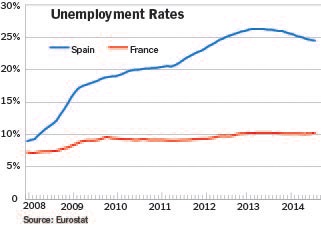Truthout is an indispensable resource for activists, movement leaders and workers everywhere. Please make this work possible with a quick donation.
The Financial Times recently published a pretty decent article on the emerging doctrine of “Draghinomics,” which looks a lot like Blanchardnomics, which looks a lot like Krugmanomics – hey, we all studied macroeconomics at M.I.T. in the mid-1970s.
But I was struck by this bit: “One other senior eurozone official attending the Italian forum which gathers together policy makers, business people and academics said: ‘Structural reforms are key. Those countries that have made these efforts are performing better: Ireland, Spain and Portugal. Italy and France should think a little bit about this.’ “
Yep, Spain offers a useful lesson for France (see the chart).
 For those of us not part of the structural reform cult, the story of Spain is this: The country experienced a full-scale depression when its housing bubble burst. This depression has led to a gradual, painful “internal devaluation” as labor costs have come down, making Spain more competitive with the rest of Europe. As a result, Spain is finally starting a slight recovery, with its growth rate in recent quarters (but only in recent quarters) higher than that of France.
For those of us not part of the structural reform cult, the story of Spain is this: The country experienced a full-scale depression when its housing bubble burst. This depression has led to a gradual, painful “internal devaluation” as labor costs have come down, making Spain more competitive with the rest of Europe. As a result, Spain is finally starting a slight recovery, with its growth rate in recent quarters (but only in recent quarters) higher than that of France.
To see this as a triumph of structural reform requires preconceptions so strong it’s hard to see why you would even bother looking at data.
Replaying the 1930s
When the 2008 economic crisis struck, anyone who knew even a little history had nightmares about a replay of the 1930s – not just the depth of the Depression, but the downward political spiral into dictatorship and war.
But this time was different: The banking crisis was contained, the plunge in output and employment leveled out, and modern Europe’s democratic political culture proved more resilient than that of the interwar years. All clear!
Or maybe not. In terms of the economics, an effective crisis response was followed by a wrongheaded turn to austerity and, in Europe, a combination of bad monetary policy with a currency system that in some ways is turning out to be worse than the gold standard. The result is that while the first few years of this crisis were far better than the 1930s, at this point Europe’s economic performance is actually worse than it was in 1935.
And the political scene is eroding. One European nation, Hungary, has already reached the point where its leader is openly declaring his intention to end liberal democracy; thanks to austerity, extremist parties are gaining ground in elections, with Sweden (which squandered its early success) the latest shocker; and, of course, separatist movements are scaring everyone.
We’re still nowhere near the 1930s politically. But you do start to wonder whether self-congratulation over the political handling of Depression 2.0 will eventually look as foolish as the economic optimism of a few years ago.
Holding Trump accountable for his illegal war on Iran
The devastating American and Israeli attacks have killed hundreds of Iranians, and the death toll continues to rise.
As independent media, what we do next matters a lot. It’s up to us to report the truth, demand accountability, and reckon with the consequences of U.S. militarism at this cataclysmic historical moment.
Trump may be an authoritarian, but he is not entirely invulnerable, nor are the elected officials who have given him pass after pass. We cannot let him believe for a second longer that he can get away with something this wildly illegal or recklessly dangerous without accountability.
We ask for your support as we carry out our media resistance to unchecked militarism. Please make a tax-deductible one-time or monthly donation to Truthout.